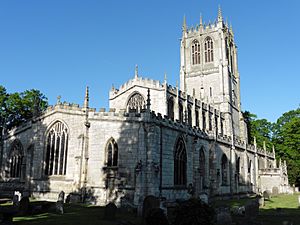St Mary's Church, Tickhill facts for kids
Quick facts for kids St Mary's Church, Tickhill |
|
|---|---|
 |
|
| OS grid reference | SK 59174 93086 |
| Denomination | Church of England |
| Churchmanship | Broad Church |
| History | |
| Dedication | St. Mary |
| Specifications | |
| Tower height | 128 feet (39 m) |
| Administration | |
| Parish | Tickhill |
| Diocese | Sheffield |
| Province | York |
St Mary's Church is a very old and important church located in Tickhill, a town in South Yorkshire, England. It is a Church of England church, which means it's part of the main Christian church in England.
This church is considered a Grade I listed building. This special title means it's a building of great historical interest and importance. The church was first built a very long time ago, in the early 1100s. It was made using a local stone called Magnesian Limestone.
While it started in the Norman style, the church you see today mostly looks like it was built in the Perpendicular Gothic style. You can still spot parts from earlier styles like Early English Gothic and Decorated Gothic architecture. The tall tower at the west end of the church stands about 128 feet high. St Mary's Church is still an active place where people worship today.
What is the Organ at St Mary's Church?
The church has a large musical instrument called an organ. This organ was first built in 1857 by a person named Charles Brindley from Sheffield. It was one of the first organs he ever made.
The way this organ was designed shows the influence of another famous organ builder, Edmund Schulze. Brindley met Schulze at a big event called the Great Exhibition in 1851.
Over the years, the organ has been changed and improved many times. New parts have been added to it. For example, a special part called the Pedal Double Trumpet 16' was added in 2007. A protective cover was also put over the organ in 2010 to keep it safe.
What are the Bells of St Mary's Church?
Churches often have bells that ring for services or special events. St Mary's Church has a set of bells, which are sometimes called a "peal." These bells have different sizes, weights, and ages.
Here is a table showing some details about the bells at St Mary's Church:
| Bell Name | Diameter | Weight (old measure) | Weight (modern kg) | Year Made | Maker | Inscription (what's written on it) | Notes |
|---|---|---|---|---|---|---|---|
| Treble | 281⁄4" | 5 cwt. 0 qr. 10 lb | 258.55 kg | 1896 | John Taylor & Co. | "My voice I'll raise, the Lord to praise" | A gift from Anna Maria Alderson |
| 2nd | 291⁄4" | 5 cwt. 2 qr. 21 lb | 288.94 kg | 1896 | John Taylor & Co. | "On Earth bells do ring In Heaven angels sing Hallelujah" | A gift from Anna Maria Alderson |
| 3rd | 321⁄4" | 6 cwt. 2 qr. 18 lb | 338.38 kg | 1726 | Not recorded | "Be light and glad in God rejoice which is our strength and stay" | |
| 4th | 331⁄4" | 5 cwt. 0 qr. 10 lb | 258.55 kg | 1726 | Not recorded | "Always be joyful and lift up your voice to Jacob's God" | |
| 5th | 361⁄4" | 7 cwt. 3 qr. 11 lb | 398.71 kg | 1815 | James Harrison of Bacton | ||
| 6th | 38" | 9 cwt. 0 qr. 0 lb | 457.22 kg | Not recorded | "Most sweet on every pleasant strings, strike up with Lute ad Harp" | ||
| 7th | 411⁄4" | 11 cwt. 0 qr. 7 lb | 562.0 kg | 1796 | James Harrison of Bacton | ||
| Tenor | 441⁄4" | 13 cwt. 3 qr. 7 lb | 701.71 kg | 1726 | Not recorded | "Our sounding is eaich man to call to serve the Lord both grait and small" | Tuned to E♭ (flat) |
| Service Bell | 211⁄2" | 1727 | Not recorded | A gift from Anne Teykhill |
- Hundredweight (cwt) and quarter (qr) are old ways to measure weight. One hundredweight is about 50.8 kilograms. One quarter is about 12.7 kilograms.
- The Treble bell is the smallest and highest-pitched bell.
- The Tenor bell is the largest and lowest-pitched bell.
See also
- Grade I listed buildings in South Yorkshire
- Listed buildings in Tickhill

